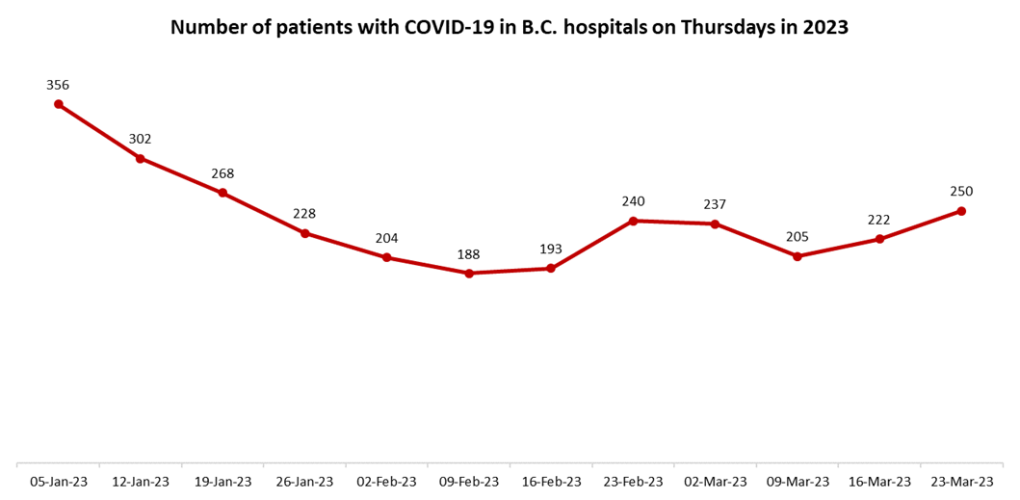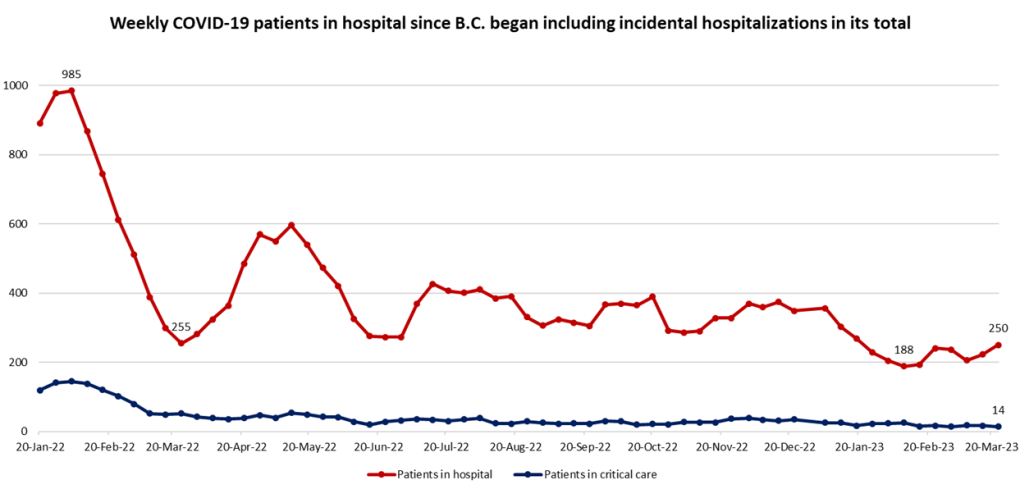
Number with COVID-19 in B.C. hospitals rises again as BCCDC tweaks wastewater reporting
 A disposable face mask is seen in this file photo from Island Health. (Island Health/Facebook)
A disposable face mask is seen in this file photo from Island Health. (Island Health/Facebook)
The number of people in hospital with COVID-19 in B.C. rose again this week, reaching its highest level since mid-January.
There were 250 test-positive patients in hospitals across the province as of Thursday, still below the 255 that was the lowest total seen in 2022, but well above this year's low of 188.
 The number of COVID-19 patients in B.C. hospitals on Thursdays in 2023 is shown. (CTV)
The number of COVID-19 patients in B.C. hospitals on Thursdays in 2023 is shown. (CTV) The number of COVID-19 patients in B.C. hospitals on Thursdays since the province switched to a "hospital census" model in January 2022 is shown. (CTV)
The number of COVID-19 patients in B.C. hospitals on Thursdays since the province switched to a "hospital census" model in January 2022 is shown. (CTV)
The hospitalization totals reported by the B.C. Centre for Disease Control every Thursday include both patients who are admitted because of serious cases of COVID-19 and those who are admitted to hospital for other reasons and test positive incidentally.
Health officials estimate that between 40 and 50 per cent of reported hospitalizations are caused by the coronavirus, while the rest are incidental.
Since the BCCDC began including incidental cases in its hospitalization total in January 2022, there have been as many as 985 people in hospital on Thursdays and as few as 188.
CASE DATA
Recent increases in hospitalizations have come alongside increases in other metrics monitored by the BCCDC each week.
On Thursday, the centre reported 405 new, lab-confirmed cases of COVID-19 during the most recent epidemiological week, which ended March 18.
That's an increase of about eight per cent from the 374 reported last week for the period that ended March 11. This week's total is also the highest the BCCDC has reported since Jan. 26, when it announced 408 new cases detected during the week that ended Jan. 21.
Official case counts only tell part of the story, however, as restrictive testing eligibility criteria means only a small fraction of B.C. residents qualify for the kind of test that is included in the BCCDC's weekly updates.
The results of at-home rapid tests are not collected or reported, and experts estimate that the official case count underestimates the number of actual infections in B.C. each week by roughly 100-fold.
WASTEWATER CHANGES
To complement the official case count, the BCCDC also monitors the concentration of SARS-CoV-2 in wastewater at treatment plants around the province.
For the last several weeks, wastewater data has shown increasing concentrations at all monitored plants in B.C.
While that trend has corresponded with rising trends in other metrics, it's difficult to say how significant the surge in wastewater concentrations has been, because the BCCDC recently changed its approach to testing.
"On Feb. 28, 2023, BCCDC began using a more sensitive test for SARS-CoV-2 in wastewater," reads a statement added to the wastewater reporting page on the BCCDC website last week.
"Increases in the viral signal after this date compared to before it may be due, in part, to this change. Please use caution when comparing data before and after Feb. 28, 2023."
CTVNews.ca Top Stories

BREAKING Orca calf that was trapped in B.C. lagoon for weeks swims free
An orca whale calf that has been stranded in a B.C. lagoon for weeks after her pregnant mother died swam out on her own early Friday morning.
Minister 'outraged' after AFN national chief's headdress taken from Air Canada cabin
The federal minister of Crown-Indigenous relations is calling on Air Canada to 'make things right' with the national chief of the Assembly of First Nations, who said her headdress was removed from an airplane cabin during a flight this week.
Sophie Gregoire Trudeau on navigating post-political life, co-parenting and freedom
Sophie Gregoire Trudeau says there is 'still so much love' between her and Prime Minister Justin Trudeau, as they navigate their post-separation relationship co-parenting their three children.
From faulty kids' cribs to flammable kids' bathrobes, here are the recalls of the week
Health Canada issued recalls for various items this week, including kids’ bathrobes, cribs and henna cones.
Taylor Swift dons Montreal designer's dress in 'Fortnight' video
A pair of Montreal designers' work has now been viewed over 41 million times. Taylor Swift dons a Victorian throwback black gown in her latest music video, 'Fortnight', designed by UNTTLD due Simon Belanger and Jose Manuel Saint-Jacques.
'Too young to have breast cancer': Rates among young Canadian women rising
Breast cancer rates are rising in Canada among women in their 20s, 30s and 40s, according to research by the University of Ottawa (uOttawa).
'Violation': CSIS had officer investigated after she reported a superior raped her
A CSIS officer's allegations that she was raped repeatedly by a superior in agency vehicles set off a harassment inquiry, but also triggered an investigation into her that concluded the alleged attacks were a “misuse” of agency vehicles by the woman.
'I was scared': Ontario man's car repossessed after missing two repair loan payments
An Ontario man who took out a loan to pay for auto repairs said his car was repossessed after he missed two payments.
Charlie Woods, son of Tiger, shoots 81 in U.S. Open qualifier
Charlie Woods failed to advance in a U.S. Open local qualifying event Thursday, shooting a 9-over 81 at Legacy Golf & Tennis Club.































